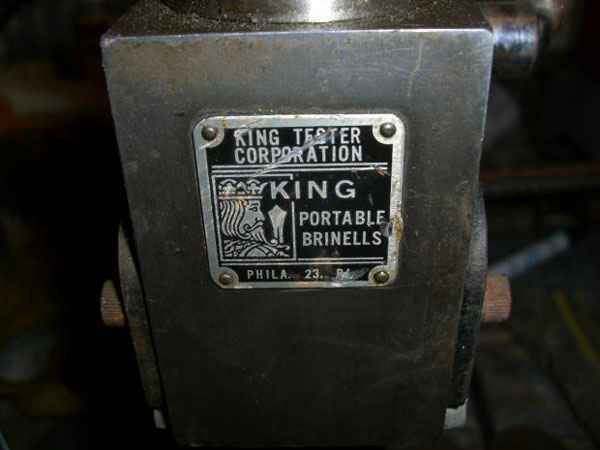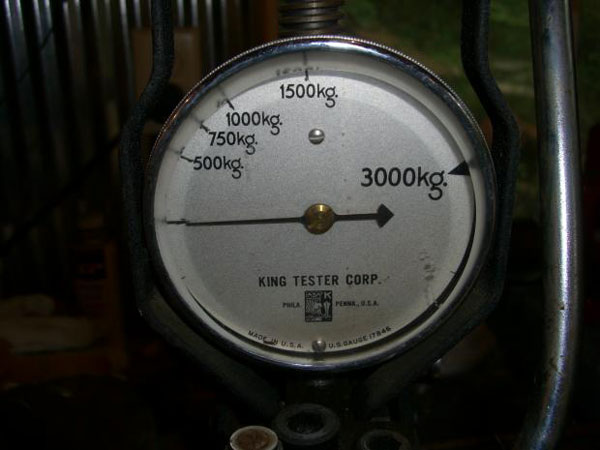I was recently given a hardness tester that is calibrated in Kg. Does anyone have a chart to convert Kg to Rc?
Also, the hydraulic oil has leaked out over the years of non-use. Is there a certain weight of oil that I should use in it?
Gary
Gary,I would heavily research the brand of tester you have to be certain of your questions, particularly the oil. On the Kg thing you may be reading that wrong, all Rockwell testers use the kg, 100 Kg and 150 Kg major loads for "A", "B" or "C" scales (100 Kg for the B, 150 for the C) but the number on the dial is the Rockwell number based upon the depth of penetration under either the 100 Kg or 150 Kg loads. If the numbers in the dial have a different designation than Rc or Rb then it should be something like BHN (Brinell), DPH or HV (Vickers) for tests other than the standard Rockwell.
The hydraulics in the tester is the touchy stuff that you really want to get right since the rate of application of the major load is critical for calibration for accurate readings. You want from 3 to 8 seconds for application the major load and you can adjust this to help in calibration. Every Spring and late Fall I cycle mine with a stop watch and readjust it due to the temperature changes in the shop affecting the response in the hydraulics. This is why these testers need to be kept in a heated area, as mine is, but a 90F summer day is still different from a 20F January one even in my heated room.
"One test is worth 1000 'expert' opinions" Riehle Testing Machines Co.
Gary
To expand on what Kevin said, Ebay is a good place to look for operator manuals. If you give make and model, maybe someone here will have the same model and can give you some of the info you are looking for.
I would also suggest that you do not experiment too much without a manual as the diamond penetrator can be damaged if not used properly.
Brian.
Ouch! As I feared it is a Brinell tester, it uses a ball indenter and requires that you measure the crater left by the kg's of weight applied, but worst of all it really isn't all that useful for knife blade hardness; but it works fine on brass, totally annealed steel and bullet lead.
Here is the inforamtion you most likely want about it, if you didn't already have it: http://www.kingtester.com/
"One test is worth 1000 'expert' opinions" Riehle Testing Machines Co.
Say, while you guys are at it, what's a good primer source(s) to get a little orientation about hardness testers and testing? You know, so I can be a tad informed, just in case I run across something in my interminable yardsaling, craiglisting and ebaying.
|quoted:
Ouch! As I feared it is a Brinell tester, it uses a ball indenter and requires that you measure the crater left by the kg's of weight applied, but worst of all it really isn't all that useful for knife blade hardness; but it works fine on brass, totally annealed steel and bullet lead.
Here is the inforamtion you most likely want about it, if you didn't already have it: http://www.kingtester.com/
Oh, well. At least the price was right.
Thanks, Kevin.
Gary
Phil
You can start here http://en.wikipedia.org/wiki/Rockwell_scale
The test is really quite simple where a minor load is placed on the test piece and then a major load is applied. The major load is then removed and the dial gives you a hardness reading. There are many different brands of hardness testers but they all do the same thing although the proceedure may differ a bit.
Some things to look for when purchasing a used hardness tester are: When it was last calibrated by someone certified to do so, condition of the diamond penetrator, does it come with a operator's manual or is one available on line.
The diamond penetrator is a very important part and if the diamond is damaged, your readings will be off. This is also an expensive part to replace.
I hope this is some of what you are looking for.
Brian



